
Spencer Bonaventure Tracy was an American actor. He was known for his natural performing style and versatility. One of the major stars of Hollywood's Golden Age, Tracy was the first actor to win two consecutive Academy Awards for Best Actor, from nine nominations. During his career, he appeared in 75 films and developed a reputation among his peers as one of the screen's greatest actors. In 1999, the American Film Institute ranked Tracy as the 9th greatest male star of Classic Hollywood Cinema.
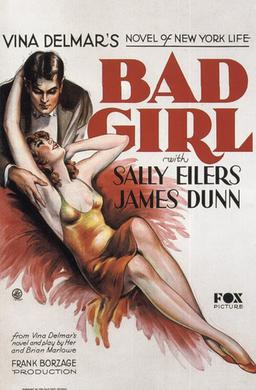
Bad Girl is a 1931 American pre-Code drama film directed by Frank Borzage and starring Sally Eilers, James Dunn, and Minna Gombell. The screenplay was adapted by Edwin J. Burke from the 1928 novel by Viña Delmar and the 1930 play by Delmar and Brian Marlowe. The plot follows the courtship and marriage of two young, working-class people and the misunderstandings that result from their not having learned to trust and communicate with one another. The film propelled then-unknown actors Eilers and Dunn to stardom. It was nominated for three Academy Awards, including Best Picture, and won for Best Director and Best Adapted Screenplay.
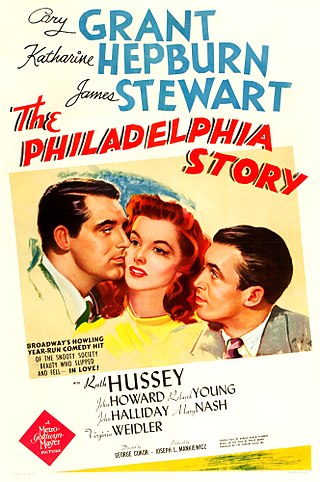
The Philadelphia Story is a 1940 American romantic comedy film starring Cary Grant, Katharine Hepburn, James Stewart and Ruth Hussey. Directed by George Cukor, the film is based on the 1939 Broadway play of the same name by Philip Barry about a socialite whose wedding plans are complicated by the simultaneous arrival of her ex-husband and a tabloid magazine journalist. The socialite, played by Hepburn in both productions, was inspired by Helen Hope Montgomery Scott (1904–1995), a Philadelphia heiress who had married Barry's friend.
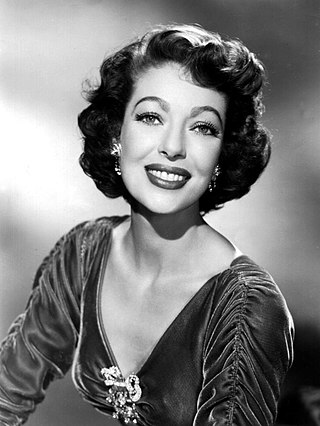
Loretta Young was an American actress. Starting as a child, she had a long and varied career in film from 1917 to 1953. She received numerous honors including an Academy Award, two Golden Globe Awards, and three Primetime Emmy Awards as well as two stars on the Hollywood Walk of Fame for her work in film and television.

The Ladies Man is a 1961 American comedy film directed by and starring Jerry Lewis. It was released on June 28, 1961, by Paramount Pictures.

The Show of Shows is a 1929 American pre-Code musical revue film directed by John G. Adolfi and distributed by Warner Bros. The all-talking Vitaphone production cost almost $800,000 and was shot almost entirely in Technicolor.
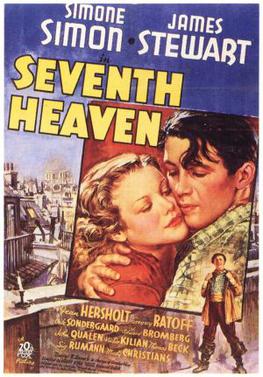
Seventh Heaven is an American romantic drama film released in 1937 by 20th Century Fox, directed by Henry King and starring Simone Simon and James Stewart. The supporting cast features Jean Hersholt, Gregory Ratoff, Gale Sondergaard, and John Qualen.
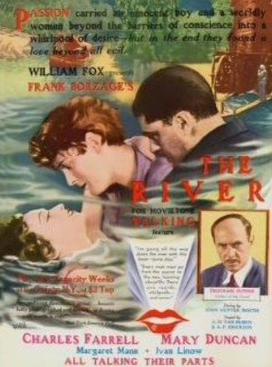
The River is a 1929 sound part-talkie drama film directed by Frank Borzage, and starring Charles Farrell and Mary Duncan. In addition to sequences with audible dialogue or talking sequences, the film features a synchronized musical score and sound effects along with English intertitles. The soundtrack was recorded using the Movietone sound-on-film system. Much of the film has been lost. A reconstructed version with the about 45 minutes of surviving film, using still images and explanatory titlecards to bridge the missing scenes, was produced by the Munich Filmmuseum, in collaboration with the cinémathèques of Switzerland and Luxembourg. This version was screened in 2006 by the American Museum of the Moving Image in New York City. Borzage also directed Farrell, opposite Janet Gaynor, in Seventh Heaven (1927), Street Angel (1928), and Lucky Star (1929) during this period.

Up the River is a 1930 American pre-Code comedy film directed by John Ford, and starring Claire Luce, Spencer Tracy and Humphrey Bogart. The plot concerns escaped convicts, as well as a female convict. It was the feature film debut role of both Tracy and Bogart. Despite Bogart being billed fourth, Tracy's and Bogart's roles were almost equally large, and this is the only film in which they appeared together. Up the River is also Bogart's only film directed by John Ford. Bogart's image is featured with Luce on some of the film's posters rather than Tracy's since Bogart was the romantic lead with Luce. Fox remade the film in 1938 starring Preston Foster and Tony Martin playing their roles.
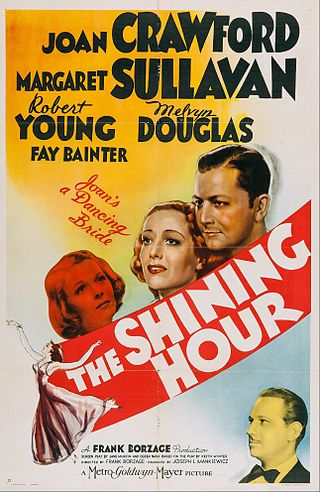
The Shining Hour is a 1938 American romantic drama film directed by Frank Borzage, based on the 1934 play The Shining Hour by Keith Winter, and starring Joan Crawford and Margaret Sullavan. The supporting cast of the MGM film features Robert Young, Melvyn Douglas, Fay Bainter and Hattie McDaniel.
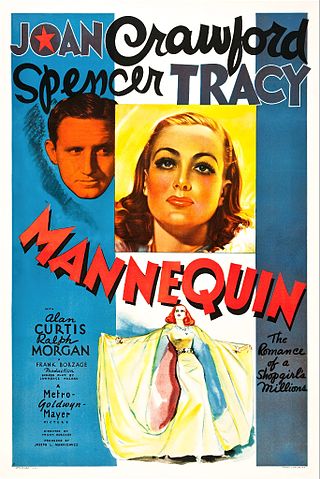
Mannequin is a 1937 American drama film directed by Frank Borzage and starring Joan Crawford, Spencer Tracy, and Alan Curtis. Crawford plays Jessie, a young working class woman who seeks to improve her life by marrying her boyfriend, only to find out that he is no better than what she left behind. She meets a self-made millionaire with whom she falls in love despite his financial problems.

Strange Cargo is a 1940 American romantic drama film directed by Frank Borzage and starring Clark Gable and Joan Crawford in a story about a group of fugitive prisoners from a French penal colony. The adapted screenplay by Lawrence Hazard was based upon the 1936 novel, Not Too Narrow, Not Too Deep, by Richard Sale. The film was produced by Joseph L. Mankiewicz for Metro-Goldwyn-Mayer; it was the eighth and last film pairing of Crawford and Gable, and the first Gable picture released in the wake of Gone with the Wind. The supporting cast includes Ian Hunter, Paul Lukas, Eduardo Ciannelli, and Peter Lorre.

20,000 Years in Sing Sing is a 1932 American pre-Code drama film set in Sing Sing Penitentiary, the maximum security prison in Ossining, New York, starring Spencer Tracy as an inmate and Bette Davis as his girlfriend. It was directed by Michael Curtiz and based on the nonfiction book, Twenty Thousand Years in Sing Sing, written by Lewis E. Lawes, the warden of Sing Sing from 1920 to 1941.

I Take This Woman is a 1940 American drama film directed by W. S. Van Dyke and starring Spencer Tracy and Hedy Lamarr. Based on the short story "A New York Cinderella" by Charles MacArthur, the film is about a young woman who attempted suicide in reaction to a failed love affair. The doctor who marries her attempts to get her to love him by abandoning his clinic services to the poor to become a physician to the rich so he can pay for her expensive lifestyle.
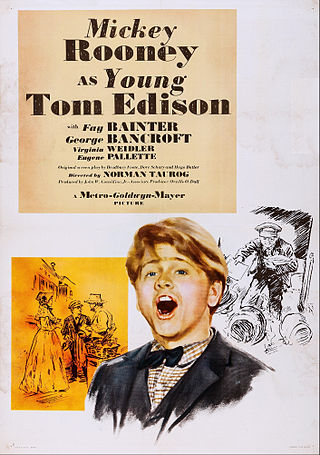
Young Tom Edison is a 1940 biographical film about the early life of inventor Thomas Edison directed by Norman Taurog and starring Mickey Rooney. The film was the first of a complementary pair of Edison biopics that Metro-Goldwyn-Mayer released in 1940. Edison, the Man, starring Spencer Tracy, followed two months later, completing the two-part story of Edison's life.

Canyon Passage is a 1946 American Western film directed by Jacques Tourneur and set in frontier Oregon. It stars Dana Andrews, Susan Hayward and Brian Donlevy. Featuring love triangles and an Indian uprising, the film was adapted from the 1945 Saturday Evening Post novel Canyon Passage by Ernest Haycox. Hoagy Carmichael (music) and Jack Brooks (lyrics) were nominated for Academy Award for Best Original Song for "Ole Buttermilk Sky."

Young America is a 1932 American Pre-Code drama film about two juvenile delinquents, Arthur and Nutty, directed by Frank Borzage and starring Spencer Tracy and Doris Kenyon. It was first adapted for the screen by Maurine Watkins from the play by Fred Ballard. William M. Conselman rewrote the screenplay, and Maurine Watkins's name no longer appeared on the credits. Raymond Borzage plays Edward "Nutty" Beamish.
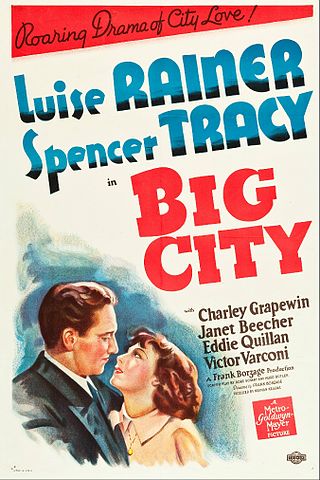
Big City is a 1937 American drama film directed by Frank Borzage and starring Luise Rainer and Spencer Tracy. The film was also released as Skyscraper Wilderness.

Three Blind Mice is a 1938 American romantic comedy film directed by William A. Seiter and starring Loretta Young, Joel McCrea, and David Niven that was based upon a play by Stephen Powys.

Lawrence Hazard was an American playwright and screenwriter active between 1933 and 1958. His career was cut short when he died at age 61 in 1959. His films include Man's Castle (1933) directed by Frank Borzage and starring Spencer Tracy and Loretta Young; Mannequin (1937) directed by Borzage and starring Joan Crawford and Spencer Tracy; Strange Cargo (1940) directed by Borzage and starring Clark Gable and Joan Crawford; The Spoilers (1942) starring Marlene Dietrich and John Wayne; Jackass Mail (1942) starring Wallace Beery; Dakota (1945) starring John Wayne and Walter Brennan, and numerous other films as well as scripts for television anthologies in the 1950s.





















